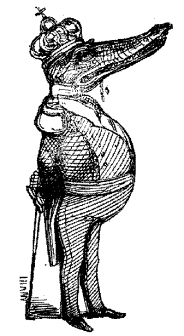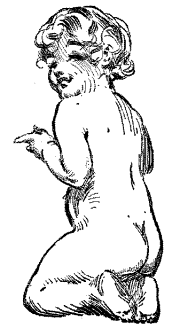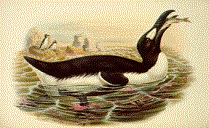
Lewis Carroll, cleaning a lens
3E Lewis Carroll Puzzles
|
 |
Lewis Carroll, cleaning a lens |
Once master the machinery of Symbolic Logic, and you have a mental occupation always at hand, of absorbing interest, and one that will be of real use to you in any subject you may take up. It will give you clearness of thought - the ability to see your way through a puzzle - the habit of arranging your ideas in an orderly and get-at-able form - and, more valuable than all, the power to detect fallacies, and to tear to pieces the flimsy illogical arguments, which you will so continually encounter in books, in newspapers, in speeches, and even in sermons, and which so easily delude those who have never taken the trouble to master this fascinating Art.
Lewis Carroll
Lewis Carroll may have exaggerated a little, as math professors often do about the utility of their subject. Carroll is best known for his nonsensical books, including the infamous “Alice in Wonderland”, written for children of ages five to ninety; but his main line of work was as a professor of mathematics at Oxford University in England. He studied logic as a vocation, and he played with logic in his writings. His stories of little girls and strange creatures are filled with bad puns and other plays with words, absurd implications, contradictions, and numerous and various offenses to common sense. It is as though he were writing his silly stories as much to amuse himself as to entertain his audiences.
|
 |
|
According to the |
|
As a teacher of logic and a lover of nonsense, Carroll designed entertaining puzzles to train people in systematic reasoning. In these puzzles he strings together a list of implications, purposefully inane so that the reader is not influenced by any preconceived opinions. The job of the reader is to use all the listed implications to arrive at an inescapable conclusion. You will get the general idea after a few examples.
We begin with one of Lewis Carroll's simpler puzzles, and work our way up to harder ones.
(a) All babies are illogical.
(b) Nobody is despised who can manage a crocodile.
(c) Illogical persons are dispised.
As the subjects of this puzzle are people, we take the universe as the set of all people. We will rewrite each statement in the puzzle as an implication. First we define simpler statements,
B : it is a baby |
|
L : it is logical |
M : it can manage a crocodile |
D : it is despised , |
where “it” in this context refers to a general person. Then the three statements can be rephrased as
(a) B → ~L : If it is a baby then it is not logical. |
(b) M → ~D : If it can manage a crocodile then it is not despised. |
(c) ~L → D : If it is not logical then it is despised. |
Our aim is to use transitive reasoning several times, stringing together a chain of implications using all the given statements. We have an arrow pointing from B to ~L, and likewise an arrow pointing from ~L to D; thus we are able to start with B and arrive at the conclusion D. However, the second statement is still not utilized. But since any implication is equivalent to its contrapositive, we may replace the second statement with its contrapositive D → ~M. Then we get the transitive reasoning chain
B → ~L → D → ~M .
We reason that if B is true, then ~L is true, hence D is true, and therefore ~M is true. Our ultimate conclusion is the statement
B → ~M : If it is a baby then it cannot manage a crocodile .
In ordinary language we would more likely rephrase this answer to the puzzle as
“No baby can manage a crocodile.”
Alternatively, we could write the answer as the contrapositive statement
M → ~B : If it can manage a crocodile then it is not a baby.
The translation into words then would be something like
“Anyone who can manage a crocodile is not a baby.”
|
 |
|
 |
Next we consider a Lewis Carroll puzzle with four statements.
(a) None of the unnoticed things, met with at sea, are mermaids.
(b) Things entered in the log, as met with at sea, are sure to be worth remembering.
(c) I have never met with anything worth remembering, when on a voyage.
(d) Things met with at sea, that are noticed, are sure to be recorded in the log.
|
 |
After a careful reading of the statements, we deduce that the subjects under discussion belong to the somewhat vague category “things met with at sea”, and so we take this set as the universal set. Our simpler statements are
N : it is noticed |
M : it is a mermaid |
L : it is entered in the log |
R : it is worth remembering |
I : I have met with it at sea . |
We write each of the statements (a) - (d) symbolically, along with each statement's contrapositive :
(a) ~N → ~M |
, |
M → N |
(b) L → R |
, |
~R → ~L |
(c) I → ~R |
, |
R → ~I |
(d) N → L |
, |
~L → ~N . |
Next we gaze at the symbolic statements until we discover that we can string them all together as
I → ~ R → ~L → ~N → ~M .
Therefore, the solution to the puzzle is the implication
I → ~M : If I have met with it at sea then it is not a mermaid .
Alternatively, we could choose the contrapositive
M → ~I : If it is a mermaid then I have not met with it at sea .
A preferable translation into ordinary language is
“I have never met with a mermaid at sea.”
Lastly, we solve a Lewis Carroll puzzle with five statements.
(a) No interesting poems are unpopular among people of real taste.
(b) No modern poetry is free from affectation.
(c) All your poems are on the subject of soap-bubbles.
(d) No affected poetry is popular among people of real taste.
(e) No ancient poem is on the subject of soap-bubbles.
|
 |
The universe in this puzzle is the collection of all poems, while the five assertions are implications involving the simpler statements
I : it is interesting |
, |
P : it is popular among people of real taste |
M : it is modern |
, |
A : it is affected |
Y : it is your poem |
, |
S : it is on the subject of soap bubbles . |
Again, we write each statement symbolically, along with its contrapositive:
(a) I → P |
, |
~P → ~I |
(b) M → A |
, |
~A → ~M |
(c) Y → S |
, |
~S → ~Y |
(d) A → ~P |
, |
P → ~A |
(e) ~M → ~S |
, |
S → M . |
You may have noticed in our previous two puzzles that the string of implications connecting all the statements begins with a letter occurring in only one of the assertions. In this puzzle the letters Y and I meet this criterion. If we begin with the letter I we produce the chain
I → P → ~A → ~M → ~S → ~Y ,
and if we begin with the letter Y we create the contrapositive chain,
Y → S → M → A → ~P → ~I .
Thus the solution to the puzzle is I → ~Y, or the equivalent contrapositive Y → ~I. The simplest translation back into words is perhaps the cruel statement
“Your poetry is not interesting.”
EXERCISES 3E
Lewis Carroll created these puzzles. In each puzzle you are to write the assertions symbolically as implications, along with their contrapositives, and then string together with arrows all the assertions to arrive at a final conclusion. Your answer will be an ultimate implication, which you must then cleverly translate back into ordinary language.
|
|
|
 |
 |
|
|
|
|
 |
 |
|
|
|
|
 |
 |
|
|
|
|
 |
 |
|
|
|
|
 |
 |
|
|
|
|
 |
 |
|
|
|
|
 |
 |
|
|
|
|
 |
 |
|
|
|
|
 |
 |
|
|
|
|
 |
 |
|
 |
|
|
|
 |
|
|
|
 |
|
|
|
 |
 |
|
|
|
|
 |
|
 |